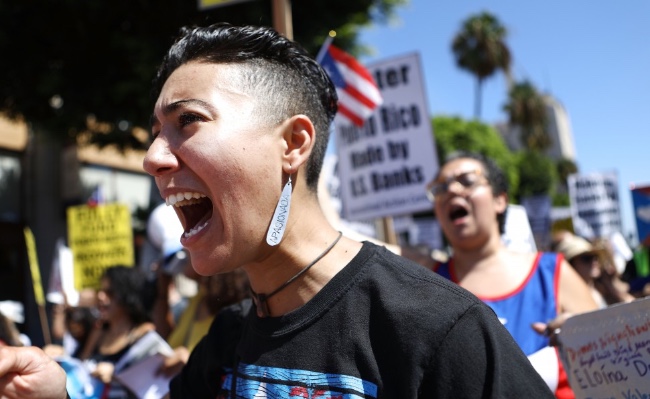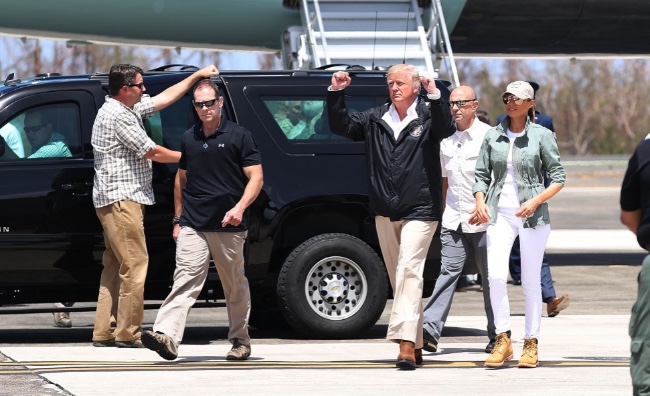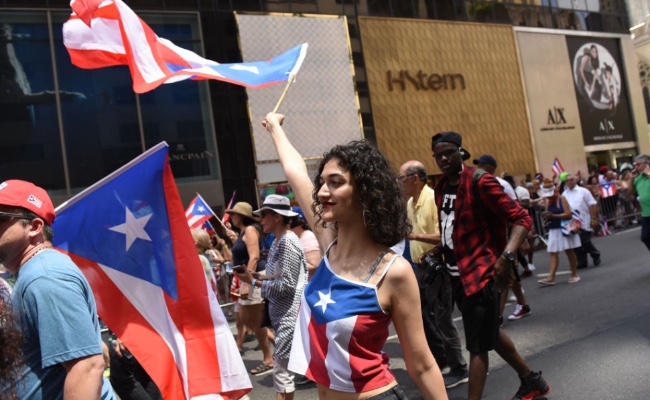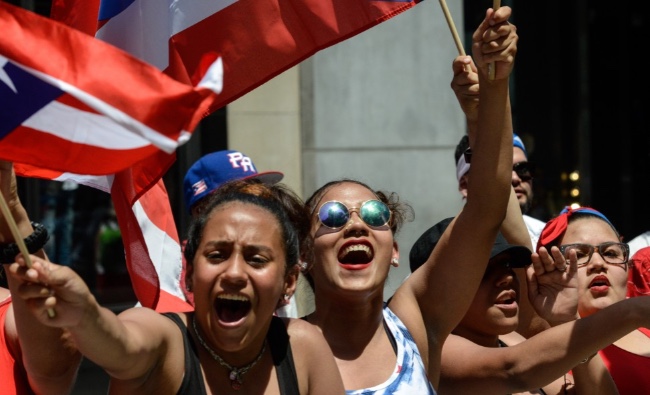
Our president went on another rant last week about Puerto Rico. I’d rehash it but whenever I do a murderous shriek starts ringing in my ears — causing blood to come out of my nostrils, tear ducts, and…wherever (Don’t you just love a classic callback?). Suffice it to say it was yet another insult (in a long series of vindictive, inaccurate, and offensive statements) aimed at the people devastated by Hurricane Maria.
It’s been a year since the hurricane touched down on Puerto Rico’s shores and recovery has been ongoing. And slow. And mostly ignored on the mainland. But last month — when a George Washington University study revealed that the death toll on the island was close to 46 times the original estimate and the official number was changed to 2,975 people (for context 1,833 died in Katrina and 2,977 due to the attacks on 9/11) — it re-entered the collective consciousness. In doing so, it became a renewed target for our president’s alternating rage at those who question or oppose him and delusions of grandeur.
“I think we did a fantastic job in Puerto Rico,” he told CNN with a straight face. He said this shortly after hearing the news that the death toll makes Maria the deadliest natural disaster on U.S. soil in a hundred years. And that’s when the shrieking began.
I’m Puerto Rican. Or half. My father was born on the island but moved to Williamsburg, Brooklyn with my grandparents and his five older siblings in the 50s. Their story is the classic American dream, my grandfather began cutting hair in hotels and eventually moved up to owning his own barbershop. Meanwhile, my father and his brothers and sister were forcibly assimilated into mainland American culture while facing both subtle and blatant racism on a daily basis.
It worked. By the time my brother and I came along, my dad thought there was no benefit in us learning Spanish, so he never spoke it to us. He talked rarely about his childhood and since I grew up in northeast Wisconsin (away from extended Puerto Rican family) where there were few Puerto Ricans, I grew up with little connection to my heritage. I mean don’t get me wrong, I loved West Side Story as much as the next theater nerd — which was, I’m sure, a very accurate portrayal of the Puerto Rican experience — but other than that and a few family weddings here and there where I embarrassed myself on the dance floor, I didn’t have much opportunity to feel ownership of being Puerto Rican. My family did visit Puerto Rico every few years growing up, but I always felt like a tourist. We would do the stuff everyone does. Eat some good food, sit on the beach, visit Old San Juan, drive through El Yunque… I was Puerto Rican and proud of it, in theory, but I also felt like an outsider with no ‘claim’ to the place where my father had been born.
This is a feeling that I think a lot of second and third generation mainland Puerto Ricans in their 20s and 30s share. It’s a pretty place to vacation, but it isn’t ours. Or at least that was how I felt. Post-Maria there’s been a shift. As I watch report after report of how badly on-island Puerto Ricans have suffered over the last year, I have this stirring in me to connect to the island.
Puerto Rico, the place where my father was born, is in crisis and I feel an increasing sense of responsibility.
Because our federal government has failed Puerto Rico.

One frustrating aspect of the loss of life in Puerto Rico this year (aside from the lack of government transparency) is that so many of the nearly 3000 deaths were preventable. Thousands of people have died in the aftermath of the storm due to things like sepsis, inability to refrigerate their medications, heat, nearby hospitals being closed, and the power to run breathing devices. So while some in the federal government have praised themselves on the 10/10 response and insist (still) that Puerto Ricans should be thanking them, the reality is that our government failed Puerto Rico. And it’s a little hard to believe that racism didn’t play into at least some part of that failure.
Take the way the federal government responded to the two hurricanes that hit just before Maria. Texas and Florida, hit by Harvey and Irma respectively, received far more aid (even though Maria was a stronger storm with higher wind speeds). Frontline in conjunction with NPR, found that, when you compare the numbers in the nine days after the storms, there are drastic differences in the responses. For instance, during that period, Puerto Ricans were supplied with 2.8 million liters of water. Harvey’s victims received 4.5 million liters and Irma’s, 7 million. Puerto Ricans also received about one-tenth of the food as Irma victims. And while they needed hundreds of thousands of tarps, Puerto Rico was supplied with just five thousand. That’s in comparison to the 98 thousand Florida received after Irma. In terms of boots on the ground, in the nine days following the storms, ten thousand federal disaster relief personal arrived in Puerto Rico. Harvey had 30 thousand.
And it was only this month that power was finally restored to the last customers on the island — ending the longest, largest blackout in American history (and second in the world). It’s hard to imagine any other Americans in the country going that long without such a basic need. Puerto Ricans are American citizens but, as the numbers show, less worthy in the eyes of the government to receive full aid after a disaster.
Because as Puerto Ricans, we are connected by a shared, recent history. That counts for something.

Recently, my friend Esteban came back from a few months volunteering with a group called All Hands and Hearts in Yabucoa — a village which was hit especially hard by the hurricane. I spoke to him shortly after he got back.
“I basically went to learn what it means to be Puerto Rican,” he told me. “I always grew up with my father telling us to be proud. We always knew that we were supposed to be proud to be Puerto Rican. But I never really knew why. It took me less than a week to figure out what that was, once I got to Yabucoa.”
What he’d felt, almost immediately, was the sensation of “coming home” to somewhere he’d never lived. Days were filled with work helping with the rebuilding process. Nights, in a little grocery store that doubled as a village bar. Salsa played on an old speaker, hung on a pole outside, for dancing.
“Despite all of this shit that has happened to them and having very little, they’re still the most generous people you will ever meet,” Esteban said, crying at points during our conversation.
“So what do we do?” I asked.
“I wanted to volunteer so that I could see what it’s really like right now,” he explained after a pause. “I wanted to have a better sense of the history of Puerto Rico with a bent on where it might lead us toward the future, especially young people.” But what he found was a deeper sense that, as Puerto Ricans, the island isn’t just our past to learn from. It’s also our present. Every young Puerto Rican should go there, he says.
“I think it’s important for Puerto Ricans on the mainland….” He stops short. “I used to think that I shouldn’t have an opinion about it. About what the future is for Puerto Rico or what their relationship should be to the US. I abstained from that because I considered myself really American. I thought, ‘It’s not my argument, not my island.’ But what I would say to every Puerto Rican in Chicago, and in New York, and in Florida, and Texas, and California is: It is your island – and it is your responsibility. You are Puerto Rican.”
Because if we don’t care, as part of the Puerto Rican diaspora, who will?

There’s this interview — that happened shortly after the hurricane — where Mayor of San Juan Carmen Yulín Cruz was asked about the Puerto Rican diaspora living off island. Because at this point, more of us live on the mainland than on the island by far (5 million to the 3.5 million) with that number growing rapidly post-hurricane. She talked about the importance of them…or us.
“I think we’ve finally understood in Puerto Rico that the diaspora is just a part of us and that we a part of them,” she said. “That we are one big nation divided by a big ocean. That they can’t forget us…That when we seem silent, don’t think that it’s because we’re okay. Perhaps it’s because we are being systematically silenced. When one voice here drops, a thousand voices in the United States need to rise up to demand we’re treated with dignity.”
Right now, as I think about what those of us who grew up identifying more with a slice of deep dish pizza than mofongo owe to the island, I feel strongly that mainland millennial Puerto Ricans need to go visit. Volunteering — if you have that time and flexibility — but also (as other diasporas have done to increase tourism all over the world) to put our tourist dollars back into our homeland. Because revitalizing and infusing the places outside of San Juan with tourist money is a crucial aspect of rebuilding. As Puerto Ricans looking to connect to our personal histories we can go to the villages our grandparents grew up in — to put our feet into the same ocean, to eat in the local restaurants, to dance at the same bars— and trace our pasts as we contribute to ensuring the island’s future.
Moreover, we have the responsibility to care. To listen to the voices of the people. To find out what they actually want and need on the island and then vote those needs. Because when the federal government has shown that they care less about Puerto Ricans than other Americans, who will stand up if we don’t?
I’m planning my own trip back to Puerto Rico right now. I want to revisit the places I remember as a kid and teen. And to see the places that my dad has talked about but I’ve never experienced — like a part of the ocean that lights up at night as if thousands of electric stars came to life on the sea floor. I’d like to stumble through my bad Spanish and eat tostones and arroz con gandules. All of the food. But mostly, like Esteban, I just want to stand in the place where my family comes from and, in doing so, stand with the people there.
“If you turn your back on us, we are totally alone,” Mayor Cruz said to us, the Puerto Rican diaspora. “But if you echo and magnify our voice, we will be invincible. And we will rise. With or without help from the federal government, we will rise.”






